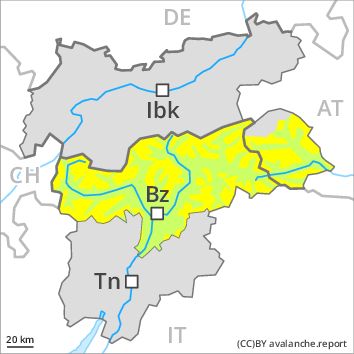Regions
Sexten Dolomites, Val Müstair Alps, Langtaufers, Schnals Ridge, Southern Stubai Alps, Southern Zillertal Alps and High Tauern, Saldurn-Mastaun Ridge, Texel Mountains, Sarntal Alps, Western Pfunderer Mountains, Eastern Pfunderer Mountains, Durreck Range, Western Rieserferner Mountains, Western Deferegger Alps, Ortler Range, Ulten Valley, Eastern Nonsberger Alps, Eastern Rieserferner Mountains, Northern Dolomites of Fiemme, Glockner Range, Gröden Dolomites, Eastern Deferegger Alps, Prags Dolomites, Schober Mountains, Lienzer Dolomites

Danger level
Avalanche Problem
Wind-drifted snow above the treeline, N-NE-E-SE-S-NW

Wind slabs.
The fresh snow and wind slabs of Saturday can be released very easily. The rather small wind slabs can be released easily, even by a single winter sport participant, especially on northeast to north to south facing aspects above the tree line. Especially wind-loaded slopes where hard layers are lying on a weakly bonded old snowpack are critical. Individual dry slab avalanches are possible. These can in isolated cases be released in near-surface layers of the snowpack and reach quite a large size.
Snowpack
Over a wide area easily released wind slabs formed. The fresh snow and wind slabs of Saturday are lying on the unfavourable surface of an old snowpack in particular on shady slopes. Faceted weak layers exist in the snowpack in particular here. Apart from the danger of being buried, restraint should be exercised as well in view of the danger of avalanches sweeping people along and giving rise to falls. The fresh snow and wind slabs of Saturday are bonding only slowly with the old snowpack.
Tendency
Fresh wind slabs are to be evaluated with care and prudence.